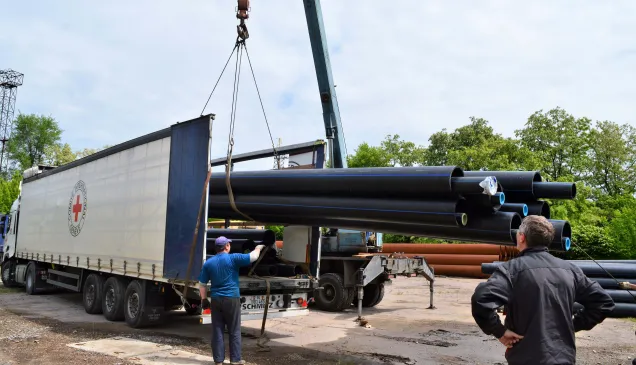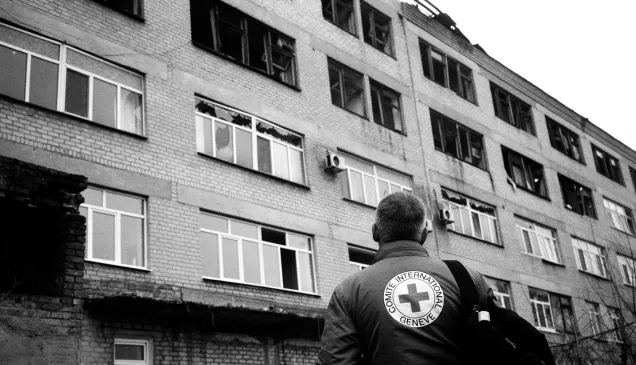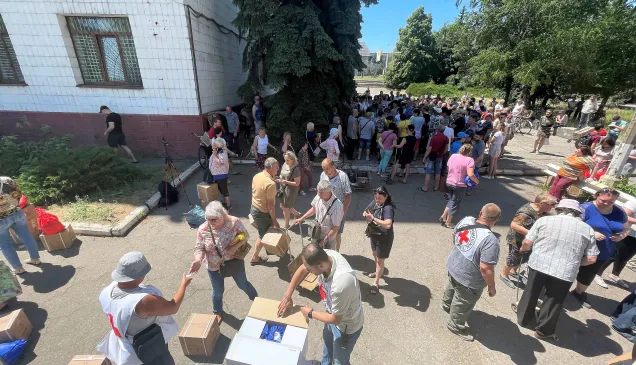Kiev/Donetsk/Lugansk (ICRC) – Two years on from the start of the conflict, and despite over a year having passed since an official ceasefire agreement was signed in Minsk, worsening violence in eastern Ukraine is bringing continued hardship for people living close to the front line.
"Many people in this area have no choice but to rely on humanitarian aid," said Alain Aeschlimann, head of the International Committee of the Red Cross (ICRC) in Ukraine. "What with the divisions imposed by the line of contact, and the major damage to civilian infrastructure due to the extensive and often inappropriate use of explosive weapons over the last two years, having enough food and water is the exception rather than the rule for many communities."
Continued shelling and a limited number of crossing points for civilians along the contact line mean that both local residents and displaced people who have nowhere else to go are finding themselves cut off from basic services. In some places, hospitals have been destroyed or occupied by the military, while schools lack teachers.
Compounding people's suffering – the anguish of missing loved ones. Over a thousand people are still unaccounted for in connection with the armed conflict, according to ICRC estimates. "Nobody knows the exact numbers, but hundreds of mothers, fathers, sons, daughters, wives and husbands are waiting for news of their loved ones," said Mr Aeschlimann. "They might be alive or dead, and this uncertainty causes intense suffering for their families. People have the right to know what happened to their loved ones. We're doing our utmost to foster cooperation between all parties involved in the search for them, from governmental bodies to forensic institutions."
About the ICRC in Ukraine
As an independent, neutral and impartial humanitarian organization, the ICRC focuses on helping the most vulnerable people. Its teams visit people detained in connection with the conflict in government-controlled areas, and are negotiating access to places of detention on the other side of the line of contact. Whenever requested to do so, the ICRC participates in operations to release and transfer detainees between the parties to the conflict. The organization is delivering food, hygiene items, medicines and building materials to the worst-affected communities. The ICRC also regularly reminds all those concerned of their obligations under international humanitarian law. These universally recognized rules, which are based on a clear distinction between civilians and military personnel, require that civilians and civilian infrastructure be spared the effects of hostilities.
Key figures about the ICRC's work in Ukraine in 2015
- More than 2 million people benefited from ICRC assistance to water- and electricity-supply companies.
- More than 330,000 people received food parcels and more than 370,000 received household essentials.
- Over 13,000 people received cash assistance, including those who worked on repairing and rebuilding homes damaged in the fighting.
- 141 health-care facilities received ICRC support.
- More than 62,000 doses of insulin were provided to patients in the Lugansk and Donetsk regions.
- 8,000 signs warning about the risk of mines and 200 rolls of high-visibility marking tape were produced and delivered to the authorities and military on both sides.
- 17 billboards warning about the risk of mines were installed at a crossing point on the contact line, as well as 25 latrines (to stop people wandering into minefields).
- 618 people detained in connection with the conflict were visited in 15 places of detention.
- 430 families are searching for their missing loved ones with the help of the ICRC and the Ukrainian Red Cross.
For further information, please contact:
Matthias Weinreich, ICRC Kiev, tel: +380 067 509 42 06
Sanela Bajrambasic, ICRC Donetsk, tel: +380 50 315 04 60
Jenny Tobias, ICRC Geneva, tel: + 79 536 92 48




